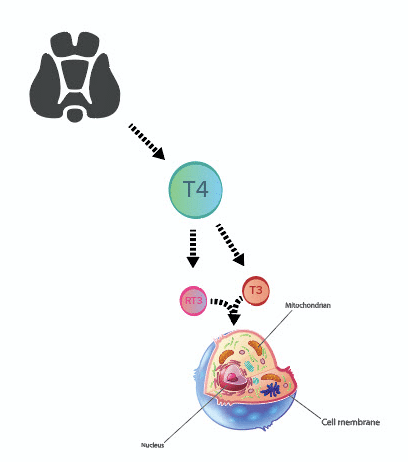
Hypothyroidism is one of the most common conditions I treat in my practice. It’s estimated to impact 5-10% of the North American population, and impacts women at a much higher rate than men.
Hypothyroidism is diagnosed when TSH levels are high and T4 or T3(thyroid hormones) hormone levels are low. When hypothyroidism is identified, the standard of care is to be put on a medication called Synthroid. This is a synthetic T4 hormone that is safe and has very few side effects. In fact, many people are put on Synthroid and experience a complete resolution of their hypothyroid symptoms.
However, some individuals find that they still feel hypothyroid symptoms (fatigue, brain fog, dry skin, weight gain) while taking Synthroid. Typically, these patients continue increasing their dose until their T4 levels are quite high, but symptoms still persist. If you still feel hypothyroid on Synthroid, there’s another treatment option that could work for you.
Thyroid Hormone Basics
The most common blood test run to test thyroid function is TSH. This hormone is produced by the brain and tells the thyroid gland to produce the two thyroid hormones: T4 and T3. The thyroid gland primarily produces T4, and a very small amount of T3.
Tissues throughout the body will convert T4 hormone into T3 hormone as needed. This allows the body to self regulate how much active T3 hormone is required at any point in time.

Why T3 Hormone Levels Matter
T3 is the metabolically active hormone. It’s the hormone that moves into the cells and creates energy for the metabolism to function. Normally, the body can convert T4 into T3 as required. However, in some individuals, this conversion process isn’t working optimally.
In these individuals, there are sufficient amounts of T4, but since they don’t convert well their T3 levels remain low. Since T3 is the active thyroid hormone, low levels will result in hypothyroid symptoms despite high T4 levels.
If you’re on Synthroid and still feel hypothyroid, it’s possible that you’re having an issue converting T4 to the active T3. As your dose increases you get more and more T4 hormone, but if you can’t convert to T3, your symptoms will persist.
Natural Desiccated Thyroid - NDT
I see many patients who go on higher and higher doses of Synthroid and feel the exact same. If this sounds like you, getting your T3 tested is extremely important. If your T3 levels are low and you’re having a conversion issue, you may be a candidate for natural desiccated thyroid (NDT) medication.
NDT is derived from the thyroid of an animal, and it contains both T4 and T3 hormones. This means that you don’t need to be able to convert properly in order to get the most active thyroid hormone—it essentially skips this step. I’ve seen many patients move from Synthroid to NDT and feel tremendously better for this reason!
One study comparing NDT to Synthroid found that nearly 50% of the participants preferred NDT treatment1. Another study found that patients who were on NDT were more satisfied with their treatment compared to Synthroid.
Next Steps
If you still feel hypothyroid on Synthroid, book an appointment to get your T3 levels assessed and see if NDT may be an option for you!
Key Takeaways
- T3 is the active thyroid hormone that is in charge of metabolic function
- Some individuals have an issue converting T4 hormone to T3 hormone
- Synthroid is a synthetic T4 hormone whereas NDT is an animal derived thyroid extract that contains T4 and T3 hormones
- Individuals who have trouble converting T4 to T3 may feel better on NDT treatment
References
- Hoang, T., Olsen, C., Mai, V., Clyde, P. and Shakir, M. (2013). Desiccated Thyroid Extract Compared With Levothyroxine in the Treatment of Hypothyroidism: A Randomized, Double-Blind, Crossover Study. The Journal of Clinical Endocrinology & Metabolism, [online] 98(5), pp.1982-1990. Available at: https://www.ncbi.nlm.nih.gov/pubmed/23539727.
- Peterson, S., Cappola, A., Castro, M., Dayan, C., Farwell, A., Hennessey, J., Kopp, P., Ross, D., Samuels, M., Sawka, A., Taylor, P., Jonklaas, J. and Bianco, A. (2018). An Online Survey of Hypothyroid Patients Demonstrates Prominent Dissatisfaction. Thyroid, [online] 28(6), pp.707-721. Available at: https://www.ncbi.nlm.nih.gov/pubmed/29620972.




